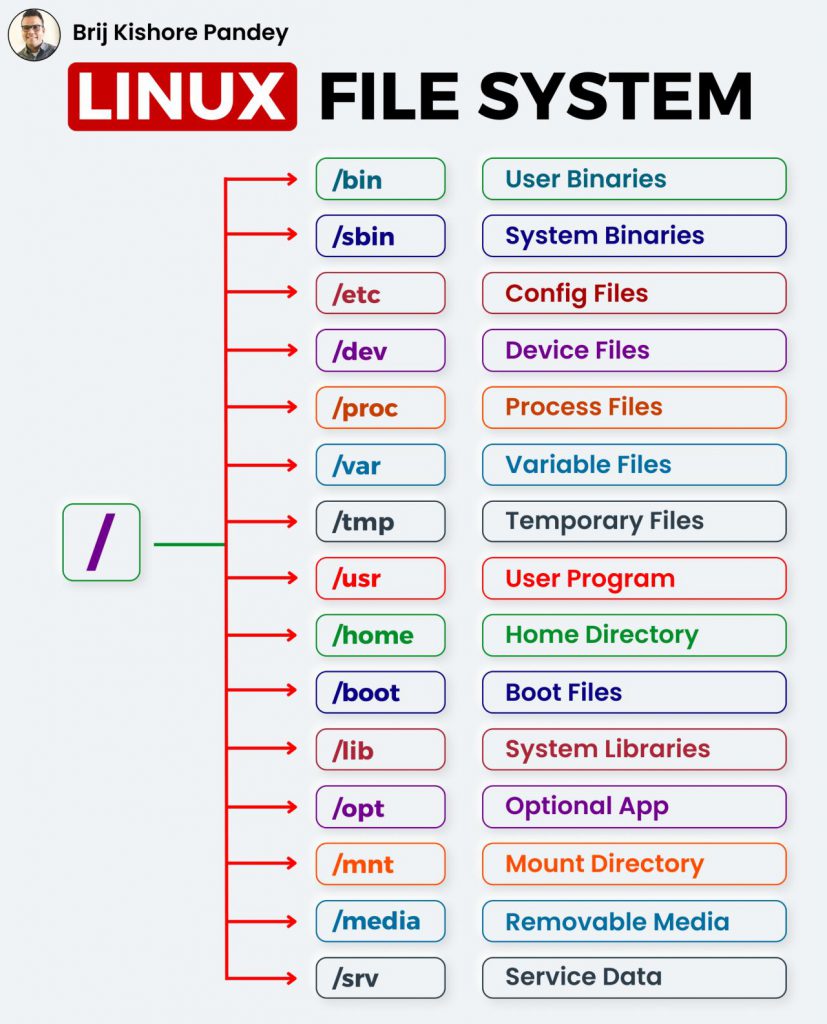
/: The root directory where it all begins. Every other directory is a subdirectory of this one.
/𝗯𝗶𝗻: Contains fundamental binary files, necessary for minimal system functioning.
/𝘀𝗯𝗶𝗻: Similar to /bin, but contains binaries essential for system bootup and repair.
/𝗲𝘁𝗰: Holds system-wide configuration files. It’s the go-to place for system administrators.
/𝗵𝗼𝗺𝗲: A personal space for users. Think of it as your work desk, containing your documents, downloads, and more.
/𝘃𝗮𝗿: Stores variable data files such as logs, emails, print queues, and most notably databases.
/𝘂𝘀𝗿: Holds user-related programs, libraries, and files.
/𝗹𝗶𝗯: Contains shared library files supporting the binaries in /bin and /sbin.
/𝗼𝗽𝘁: Optional or add-on software packages are located here.
/𝘁𝗺𝗽: A place for temporary files used by the system, cleared upon reboot.
/𝗯𝗼𝗼𝘁: All the files necessary for booting the system are here.
/𝗱𝗲𝘃: Contains device files for all hardware devices on the system.
/𝗽𝗿𝗼𝗰: An interesting directory that doesn’t contain files but system and process information.
/𝗿𝗼𝗼𝘁: This is the home directory for the root user, not to be confused with the root (/) directory at the top of the filesystem.
/𝗿𝘂𝗻: This directory hosts temporary files (like /tmp) but these are specifically related to running processes and are created at an early stage of the boot process.
/𝘀𝗿𝘃: This directory contains data for services provided by the system.
/𝘀𝘆𝘀: Similar to /proc, this is a virtual filesystem providing a unified interface through which the kernel provides information about devices, drivers, and some kernel features.
/𝗺𝗻𝘁: This is a generic mount point under which you mount filesystems or devices.
/𝗺𝗲𝗱𝗶𝗮: This directory is generally used by the system as a mount point for removable media like CDs, digital cameras, or other media devices.
I’m a DevOps/SRE/DevSecOps/Cloud Expert passionate about sharing knowledge and experiences. I am working at Cotocus. I blog tech insights at DevOps School, travel stories at Holiday Landmark, stock market tips at Stocks Mantra, health and fitness guidance at My Medic Plus, product reviews at I reviewed , and SEO strategies at Wizbrand.
Please find my social handles as below;
Rajesh Kumar Personal Website
Rajesh Kumar at YOUTUBE
Rajesh Kumar at INSTAGRAM
Rajesh Kumar at X
Rajesh Kumar at FACEBOOK
Rajesh Kumar at LINKEDIN
Rajesh Kumar at PINTEREST
Rajesh Kumar at QUORA
Rajesh Kumar at WIZBRAND

 Starting: 1st of Every Month
Starting: 1st of Every Month  +91 8409492687
+91 8409492687  Contact@DevOpsSchool.com
Contact@DevOpsSchool.com
